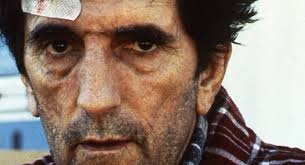It's helter skelter, falling down long winding stairs but not tripping, (although tripping in another sense might be pertinent) escalading (and often escalating) prose that so often reads like poetry, which it actually is. It's visions. A few pages in, I found a repeated page, one that I'd already read, and I thought it was a mistake, but then upon reading further, I felt about it like I felt when seeing a UCLA film student's go at a feature film where he'd edited in a repeat sequence that had appeared earlier. It was an eerie effect. Like a jump cut in the mind to one's own deja vu. I was forced to think, did that happen? Or did I imagine it? And what it did was pull me in deeper and on more than one level.
Oddly enough, a few pages later I encountered this bit of film oriented language: "These all between the moon and the road -- a rolling through of six millimeter films, costumed in manic pixie dream girl -- Thirty five millimeter camera, and radios, and microphones. Paint sticks and backpack full of magic paint -- onward to dawn!"
Onward, indeed.
Caramel Floods is like this page after page, not always making a hell of a lot of sense, but presenting visions that somehow do. It's not a sequential read with plot and arc and such things, but it is fascinating and the language is wildly inventive. The pace is loping, mesmerizing, unrelenting. If it's stream of consciousness, as it seems to be, it rivals Kerouac and Burroughs for pure, manic energy and stamina, and vision after startling vision. I don't know how long it takes him to write a page, but I suspect it's a matter of minutes, which makes the intensity and diversity of what is presented to the reader even more incredible.
And enjoyable. Read this 335 page word river as you would a book of poetry. Skip around. I believe that combinations of words like these, rule-breakers, dream paintings, help free up the mind, help it to stay nimble. Stretch it.
Fin Sorrel (his B. Travenesque nom de plume) is the publisher of Mannequin Haus, an avant-garde journal of experimentation that features fresh stories, poetry and art the likes of which you'll see nowhere else. I like to cruise through the archives and just look at the underground art and films. Then read some of the surreal fiction and poetry. It's a find, Mannequin Haus.
An issue of Mannequin Haus...
Fin Sorrel, born in 1985, dropped out of high school, took it on the lam to Oregon where he encountered anarchist literature, lost journals and mean streets. Traveling by boxcar, he actually died in Santa Barbara where they brought him back. He travels still, operating Mannequin Haus and writing plays and fiction out of a backpack, maybe. Who knows? He loves exploring ghost towns and abandoned buildings. He, like Mannequin Haus, in my opinion, is a find. And so is Caramel Floods, published by Pski's Porch. (Pski's Porch was formed July, 2012 "to make books for people who like people who like books. We hope we have some small successes.")
And this from the book at random.
Frank Sinatra Goes Flat (1953) There is a horn solo in that distant train whistle, my head is a mushroom full of the candyland games, and the wind is attacking, seeds, knocking over that which does not hold weight -- the wind is making a friend -- with the weightless cardboard or the blue hanger -- a matrix of sputters, lime machine advances, floating astronauts to a new birdhouse, to forever.
Discover Caramel Floods. It will liven up and cause havoc in any library. Therefore, it's essential. I love this weirdass book. And whatever it rode in on.












